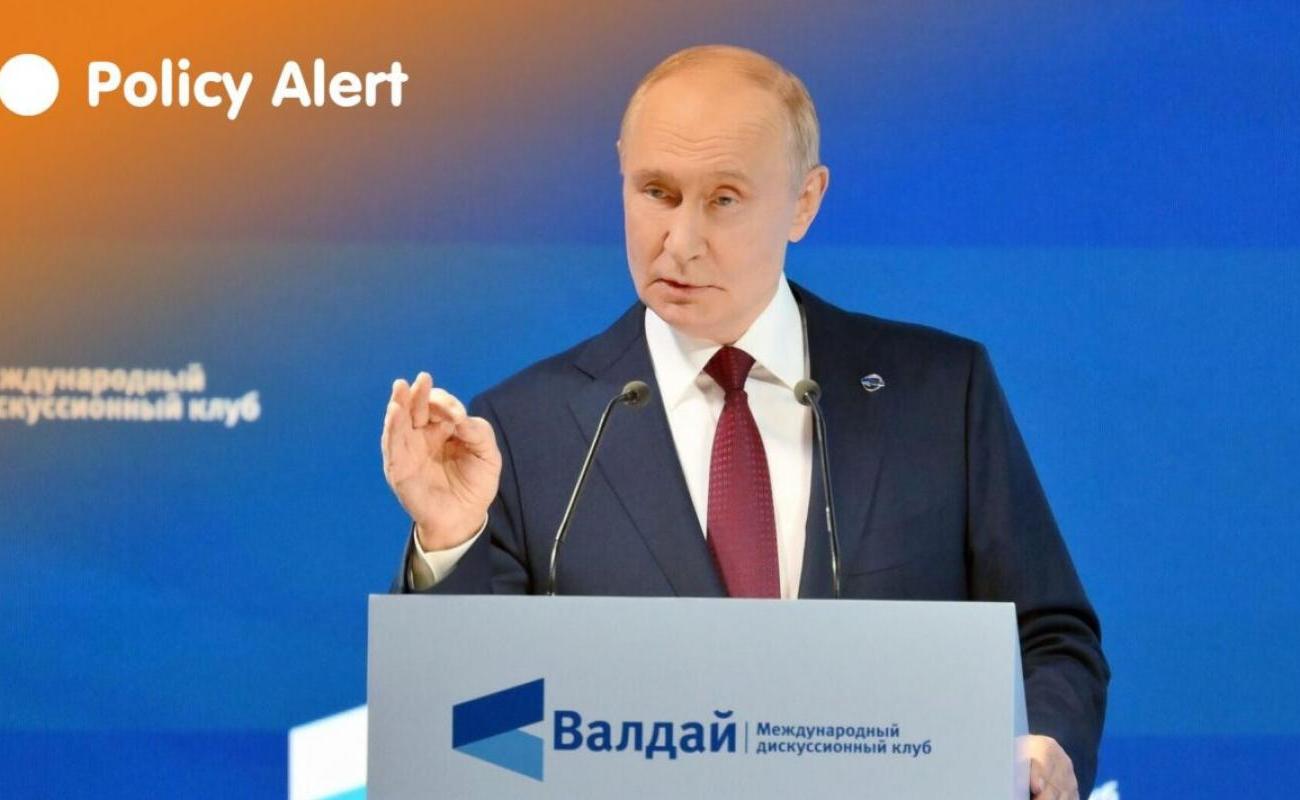Enemy number one: What Putin’s foreign policy speech says about Europe

Problem
Vladimir Putin has finally said the quiet part out loud. For the first time since the full-scale invasion of Ukraine, he has explicitly blamed Europe for the war, stating: “So far we haven’t been able to stop the hostilities, but the responsibility for that relies not on the majority [of countries] but on the minority, first and foremost Europe, who continues to escalate the conflict.”
In this year’s Valdai Club speech, which sets the tone for Russia’s foreign policy, Putin hinted at three big shifts in policy towards his main adversary. First, he accused the EU of militarisation and anti-Russian policies which he said threaten its security and domestic stability. He vowed to respond by stepping up military pressure through provocations and by expanding Russia’s arsenal.
Second, his speech made clear Moscow’s support for Europe’s anti-establishment politicians who prioritise “national issues”, citing far-right parties in France and Germany, and giving a shoutout to Hungarian prime minister Viktor Orban. For the Russian president, these political movements are a chance to fracture EU unity—on Russia and beyond—and to ease sanctions. And in case these parties need a hand, Putin spoke of the importance of “influence on the political consciousness of a potential adversary’s country”—otherwise known as information warfare. It was an implicit recognition of existing Russian influence operations and a promise to keep them running.
Third, Putin used the example of US president Donald Trump as a leader who reoriented his country away from the “globalist agenda” and towards resolving domestic issues—just as Europeans should be doing. Putin praised Trump and his politics at least six times during his speech and Q&A, suggesting Putin is doubling down on his efforts to get Washington on board with a normalisation with Russia that would sideline Europe.
Solution
These are not empty words. It comes as Russian drones and jets are increasingly violating EU airspace. The EU, via NATO, should continue investing in eastern border defence and rapid reaction forces, anticipating an increase in incidents. Similarly, the EU should be ready for Russian interference and attempts to undermine its defence build-up.
Moreover, Moscow is expanding its spending on information warfare, and as the Kremlin considers the EU establishment to be on the decline, is sure to intensify its efforts. On multiple occasions, Putin has marked what he sees as the core problems bringing the EU down: identity, migration, unsustainable social spending, and adherence to the “globalist agenda”. These are the areas where Russia will likely try to increase domestic divides, employing everything from propaganda to the direct support of anti-establishment media and political forces. In response, the EU should reinforce its communication infrastructure, especially in member states that have electoral cycles coming up.
Finally, Putin’s remarks signal Moscow’s desire to keep engaging with Trump and seek his active participation in agendas that would benefit Putin’s cause. The EU must stay vigilant in checking Washington’s inclinations to facilitate complementary relations with Moscow at the expense of Ukraine.
Context
This year’s Valdai speech highlighted Moscow’s unwavering desire to engage with Trump while sowing discord into the EU’s affairs in the hope of wearing down the bloc’s resolve to support Ukraine. The Kremlin seems to be convinced that it is possible to substantially improve Russia’s relationship with America, and that the EU is a bump in that road.
